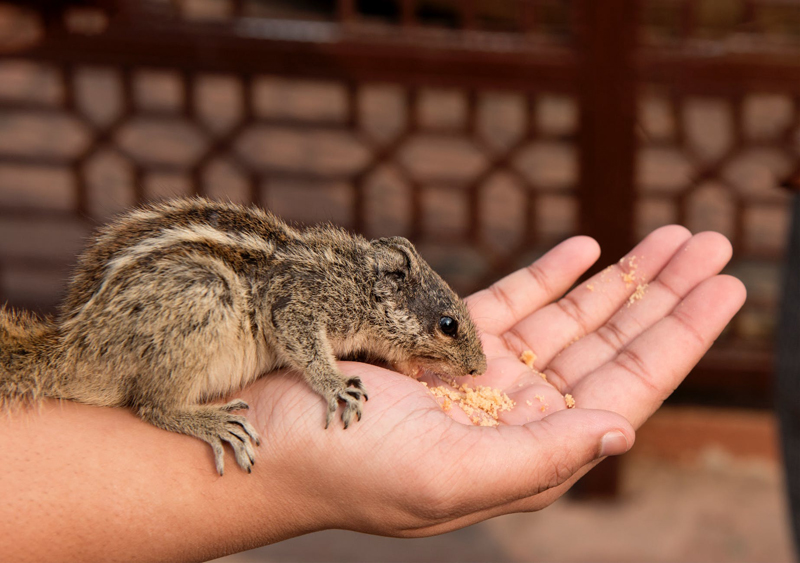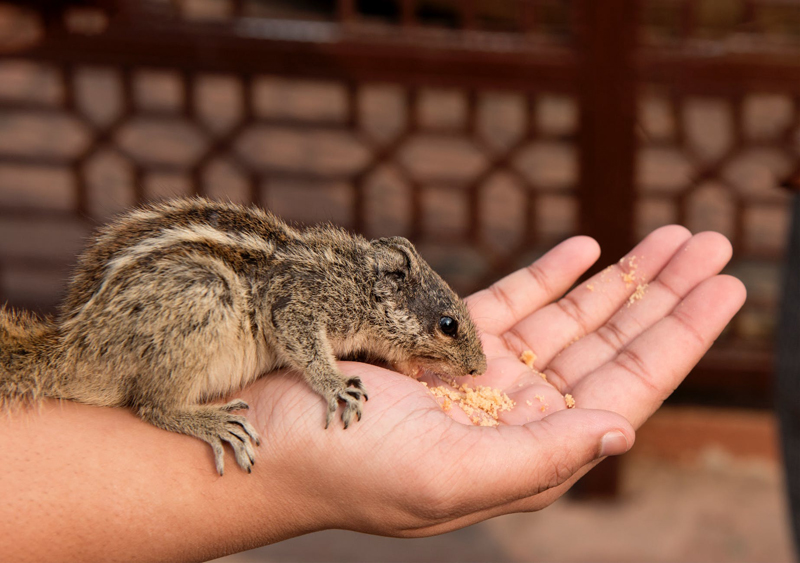Civets - Civet Cat

There are several varieties of civets, 18 in all. From the African civet, palm civic (Asian palm civet masked palm civet), large Indian civet, small Indian civet, a semi-aquatic otter civet, and more.
Some civets live in trees while others can be found in-between rocks or piles of brush. They may want to consider a new real estate agent.
They aren't good examples of fashion coordinators because they wear clashing spots with strips. Though, the combination serves them well blending into their environments.
They have a dorsal mane that becomes erect when they are excited or in danger, an excellent defense mechanism, that makes the animal look much larger than it actually is.
Most of these animals are nighttime hunters (nocturnal). They eat a variety of foods (omnivores) chowing down on bugs (they especially like beetles) small animals, and vegetation. The palm civet is more of a fruit eater than the other civets though they are also omnivores. They are called a palm civet because they are often found in palm trees in Southern Asia.
They are quite territorial and are pretty much solitary animals in the wild. In the wild they are known to live to 15-years of age. I image the lifespan would be longer living in the safety of a home, with proper medical care, and a regular healthy diet.
As with many captive exotic pets; overweight pets can become an issue. In nature they are out searching for food; walking, running, climbing, and pouncing, Watch their food intake and encourage exercise through play.
As with many animals, exotic animals found in the exotic pet industry, they are often exploited. Civets are captured by civet farmers or for civet farmers because of the highly valued musk the civet excretes. This musk is a stabilizer in perfumes, thankfully, perfume manufacturers are learning toward synthetic fixatives - I am thankful because it is a very painful and dangerous practice having their perineal glands scrapped.
The scent glands located under some species of civets tails releases a very pungent odor. Just like pet skunks the pet civet would have to have the perineal glands removed. Civets also have other scent glands. The odor these glands release are used more for a means of communication than defense. They will leave scent along the path as they travel. Other civets are able to tell if they are looking for a mate, or not. So little is known about the wild civet, it would be interesting to learn what else is communicated in these scents.
There are civet breeders in the United States and other countries throughout the world. People who breed and sell civets must be licensed through the United States Department of Agriculture (USDA). There are a few civet dealers/breeders licensed through the USDA.
The civet was thought to have been the host of the SARS virus though, according to the USDA, it turned out to be from fruit bats. So the people in chat forums can quit passing false information that the civet was the cause of 800 people dying during the 2002-2003 outbreaks.
It is best to start with a baby civet; you will find they can be quite affectionate and somewhat trainable. Their personalities are similar to a coatimundi or a raccoon. They can be destructive.
If you keep them in an outdoor pen, having little contact with them, they will become wild very quickly just as a raccoon will. Again, if you stick them in the garage they will become little terrors and very destructive. They must be kept close to you in your home. To keep them safe and your stuff safe, when you�re not there to supervise them, make or buy a nice pen for them with their toys and blankets and your pets other possessions in which they find comfort. Primarily they must be with you to form a solid loving bond. If you have an extra bedroom this would be great for a civet.
Find a veterinarian that is knowledgeable and willing to care for a civet before you acquire your pet. If he or she should become ill or injured, and you had no one to treat the animal, you'd be putting your pet in serious jeopardy.
As with any pet or exotic pet keep their pen or living area, (perhaps an extra bedroom in the house) toys, water and food dishes clean and disinfected. Make sure the animal has plenty of clean filtered water at his or her disposable at all times. Learn by the example of what the animal would eat in the wild, if it is fresh fruit, vegetation, and insects, that is what the animal should eat.
I am still not sure how some people have come to call the civet a civet cat, while they do have some cat-like characteristics, an example, how they clean themselves, they are not a cat. The Vietnamese call the civet a fox. I think I will stick with civet.
Do they make good exotic pets? I think they have the potential to be an excellent pet for the right person. This person would have to be the type of person, such as myself that doesn't mind living with raccoons or bonding with a baby skunk by keeping it in my bra holding it close to my heart. (This became a problem after my double mastectomy lol.) Young civets are quite easy to tame.
A darling baby African civet
African civet video
A civet coffee video "the ultimate brew from the bowels of a beast"; YouTube video. civet cat video
YouTube baby civic video baby civet video
Palm civet pictures (picture taken in downtown Hong Kong) civic picture
Picture of the small Indian civet small Indian civet
Large Indian Civet picture large Indian civet
Captive civet, pet civet captive civet or pet civet
Also see sidebar article Civic cat coffee, also called Kopi Luwak coffee, the caviar of all coffee, deep rich and mellow, and yes it is from the civet cat. Civet Coffee - Kopi Luwak
Subscribe free to the exotic pets newsletter. It is quick and easy Just glance to the right or scroll a bit to the bottom and subscribe. I will only bug you once a week :) Be the first to be in the know! Your information is always private!
I am also the Bird editor if you enjoy pet birds subscribe to the Birds newsletter. Birds BellaOnline
My book (paperback) FERRETS: A Complete Guide

Kindle Version of Ferrets: A Complete Guide
Ferrets: A Complete Guide
This site needs an editor - click to learn more!
You Should Also Read:
Exotic Pet Site Map
Ferrets - A Complete Guide Paperback and Kindle
Exotic Pet Shopping (the safest for your pets)
Related Articles
Editor's Picks Articles
Top Ten Articles
Previous Features
Site Map
Content copyright © 2023 by Diana Geiger. All rights reserved.
This content was written by Diana Geiger. If you wish to use this content in any manner, you need written permission. Contact
BellaOnline Administration
for details.






